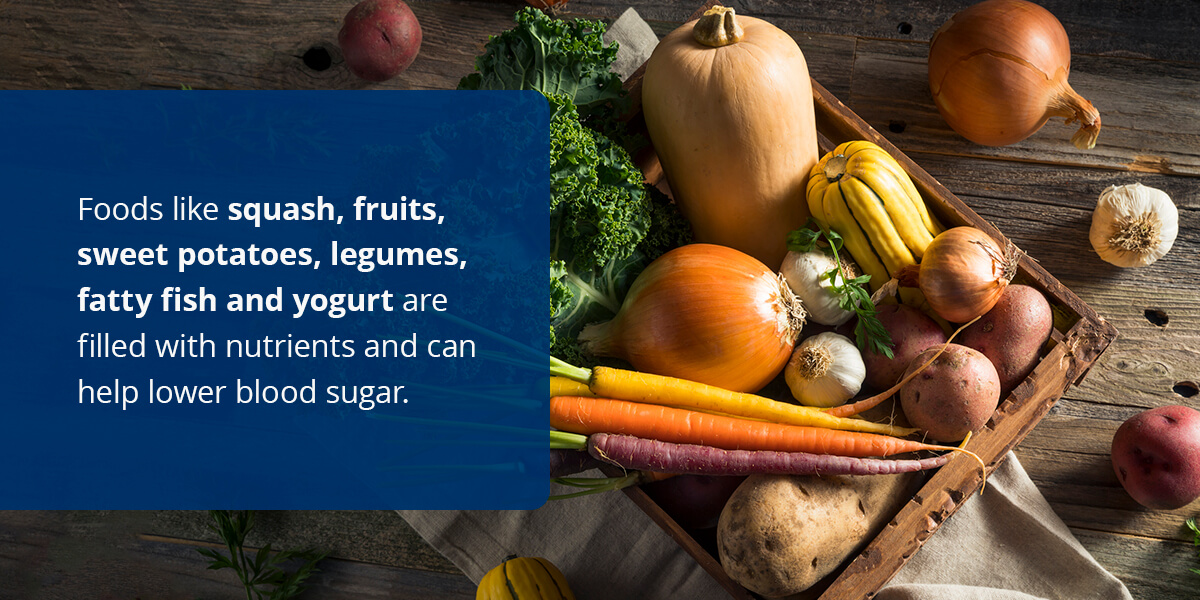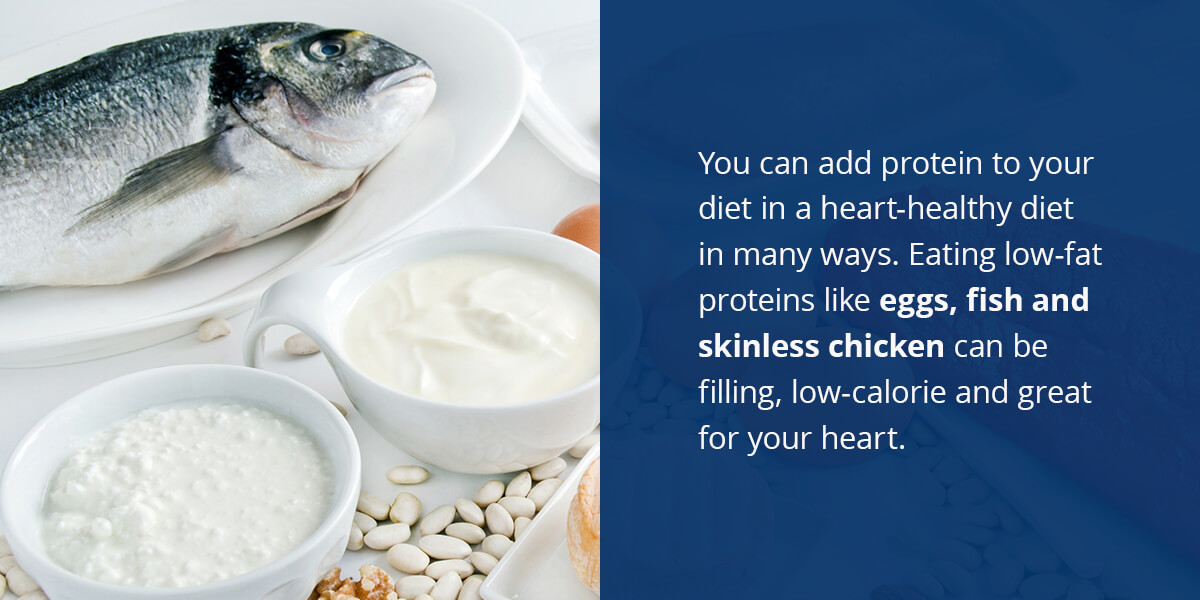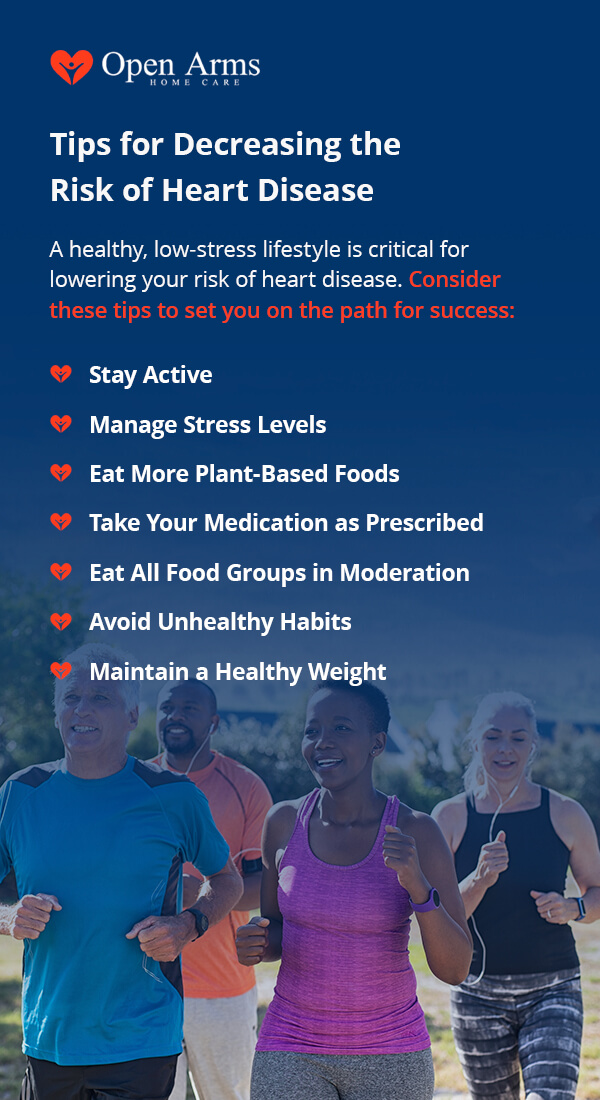Your heart supports you in many ways. It keeps your blood pumping, provides oxygen to your brain and ensures your body gets all the proper nutrients. But how can you support your heart?
Limiting fats and sodium, managing stress and staying active can help keep you and your heart healthy. It can also reduce heart disease and conditions like high blood pressure and cholesterol. Before you start your journey to a healthier heart, you may need to change your eating and lifestyle habits.
The Best Diet for Limiting Heart Disease
Eating fruits, vegetables and legumes while limiting sodium and unhealthy fats is one of the best diets for reducing heart disease. Here are some solutions to reduce cardiovascular disease.
Prioritize Nutrient-Dense Fruits and Vegetables
Eating fruits and vegetables and other plants based foods is an excellent way to get essential nutrients.
Foods like squash, fruits, sweet potatoes, legumes, fatty fish and yogurt are filled with nutrients and can help lower blood sugar. They can also make meals more satisfying, preventing overeating and snacking on unhealthy fats like chips, biscuits, high-sodium crackers and candy. You can cut up and eat your fruit and vegetable as a healthy snack or cook your vegetables with every meal.
Limit processed, fired, battered, canned and sugared fruit and vegetables with additives like sodium, cream, syrup or margarine.
You can get various vitamins and minerals like iron, potassium and calcium from one meal. For example, you can eat salad and vegetable greens like kale and spinach to get vitamins K and E. You can also add spinach, broccoli and tomatoes to a sandwich for a nutrient-rich meal. You can add fruits and vegetables to every meal, such as:
- Red grapes
- Asparagus
- Red pepper
- Carrots
- Oranges
- Broccoli
- Peas
- Green beans
- Tomato
- Blackberries
- Raspberries
Limited Unhealthy Fats
While fats are necessary diet components, some are more unhealthy than others. Foods like whole milk, fatty meat, baked goods, cream, butter, kernel oils and whole-milk chocolate can contain unhealthy, saturated and trans fats. Excess saturated and trans fats can build up, causing high cholesterol. High cholesterol puts strain on your arteries and can lead to conditions like a stroke.
You can eat less saturated and trans fats in many ways:
- Choosing a low-fat milk option
- Opting for lean protein like skinless chicken breast
- Removing fat from meat
- Using healthier cooking solutions like extra virgin olive oil instead of margarine
- Checking food labels and selecting trans-free fat products.
Eating healthy alternatives like monounsaturated and polyunsaturated fats can have positive heart health effects. Unlike trans and saturated fats, monounsaturated and polyunsaturated fats can lower LDL cholesterols and increase HDL or good cholesterol. Eating healthier fats can also be an excellent way to prevent weight gain and obesity, especially when your metabolism slows down. You can substitute saturated fats for food like:
- Extra virgin olive oil
- Avocado
- Olives
- Macadamia nuts
- Salmon
- Walnuts
- Flaxseeds
- Grass-fed milk
- Mackerel
- Greek yogurt
- Eggs
Low-Salt and Sodium Food
Limiting high-sodium food can be excellent for your heart. Too much salt can increase your blood pressure and contribute to heart disease. Excess salt causes fluid build up in your blood, putting pressure on blood vessels. High blood pressure strains your arteries, restricting blood flow and oxygen. With excess strain, blood vessels narrow, trapping fatty deposits and plaque.
Foods like processed foods, condiments, powdered soups, pasta, bread, frozen meats and high-fat canned foods can contain high sodium levels. You can substitute high-sodium foods and ingredients with fresh foods and homemade alternatives.
For example, instead of buying store-bought pasta sauce, you can make your own with fresh tomatoes, herbs and spices. When you opt for homemade, you can control your salt intake and limit hidden high-sodium ingredients. You can also select numerous high-sodium food alternatives like:
- Unsalted peanut butter
- Fresh fruits and vegetables
- Low-sodium canned soups
- Unsalted crisps and popcorn
- Fresh lean meats
- Unseasoned meat and poultry
Large Quantities of Whole Grains
Eating more whole grains may help reduce LDL cholesterol and high blood pressure. Whole grains like whole oats and whole flour are high in fiber. High blood cholesterol can lead to diseases like diabetes. Fiber can help absorb bad cholesterol, preventing it from building up in your arteries. Whole grains can also be a healthy alternative to refined products like white bread, high-sugar cereals and white pasta.
Incorporating grains in your diet offers healthy heart meals while still enjoying your favorite foods. For example, you can eat whole-grain bread for your sandwiches, enjoy pasta with a whole-grain alternative or opt for high-fiber cereals. Whole grain foods can also contain vital vitamins and minerals like vitamin B-12 and increase energy levels. Whole grains can also keep you satisfied for longer, limiting snacking on refined or unhealthy foods. You can eat various whole grains daily, such as:
- Brown rice
- Barley
- Corn
- Rye bread
- Bran cereals
- Quinoa
- Whole-wheat crackers
- Popcorn
Lean and Low-Fat Proteins
You can add protein to your diet in a heart-healthy diet In many ways. Eating low-fat proteins like eggs, fish and skinless chicken can be filling, low-calorie and great for your heart. Lean meats like chicken breasts can have less fat, reducing cholesterol buildup. They can also keep you full and provide satisfying and healthy meat alternatives. Various oily fish like salmon provide omega-3 fatty acids that can help reduce fatty deposits in the blood.
Fatty fish can also provide significantly valuable nutrients like B-12 if you can’t absorb various vitamins. While lean protein can be costly, plant protein can be a healthy and affordable alternative. Plant proteins like legumes, chickpeas, beans and lentils offer a delicious and nutritious substitute. Plant protein can also be easier to eat and digest. Incorporating plant-based protein in your diet provides variety and no-fat protein alternatives. Some other low-fat proteins include:
- Skinless turkey
- Beans
- Low-fat tofu
- Nonfat Greek yogurt
- Low-fat cottage cheese
- Ground beef
- Broccoli
- Edamame
- Egg whites
- Canned tuna
Dietary Habits for Preventing Heart Disease
A heart-healthy diet can be effective with healthy habits like eating smaller portions and planning daily meals. Here are some tips for preventing heart disease.
Manage Your Portion Sizes
While everyone can require different amounts of calories, eating more calories than you need can affect your heart. Overeating can cause excess weight gain and lead to fat buildup in your arteries. Excess fat can clog your blood vessels and constrict oxygen and blood flow, contributing to heart disease. Controlling your portion sizes can prevent overeating and excess weight gain. It’s normal to want to finish everything on your plate — sometimes, you may do so without realizing you’re full.
Knowing how much to eat and when to stop can be challenging. Understanding serving sizes for various food groups and your body can help you eat a suitable amount. Listening to your body cues is also an excellent way to determine when you’re full and satisfied. Other ways to curb your portion sizes include:
- Using a smaller plate: Eating on a smaller plate can help you decrease your food servings and get used to eating less while still feeling satisfied.
- Eat more fruits and vegetables: Adding fruits and vegetables to every meal can keep you full for longer. They are generally low in calories and fiber, so you can do more while getting beneficial nutrients.
- Eat more low-fat, lean proteins: Lean or low-fat protein can keep you full, limiting your portion sizes and the urge to eat between meals.
- Eating mindfully: When you appreciate and enjoy your food, you’re more likely to savor it and eat slower. Eating mindfully can also help you listen to your body, preventing overeating.
- Track serving sizes: Serving sizes determine how much each food group needs. For example, an average portion of rice can be one-half to one cup per serving. An average chicken breast serving can be 3.5 ounces or 100 grams. Reading recommended amounts on food labels or following diet recommendations can help you stick to healthier serving sizes.
Plan Your Meals Daily
Meal preparation can help you plan healthy and balanced meals daily. It can also prevent you from buying takeaways or snacking on calorie-dense foods. You can prepare your breakfast, lunches and dinners to incorporate balanced nutrients and healthy portions. For example, you can pack a serving of rice, vegetables, lean protein and a healthy fat like avocado for lunch or dinner.
You can also pack high-fiber snacks like fruits and vegetables. By planning your meals, you ensure you get all the suitable nutrients. It also provides more variety, making food more exciting and enjoyable.
Use Less Salt
While salt can add flavor to various meals, using it sparingly is generally better for your heart. Many seafoods and canned or processed foods can have naturally high sodium levels. Adding more salt can increase your daily sodium and risk of heart disease. Eating less than half a teaspoon of salt daily can contribute to a healthier lifestyle and lower blood pressure.
You can reduce your salt by cooking with less sodium and avoiding adding salt to your food when eating. Herbs, garlic and seasonings provide a flavorful alternative that can also bring new dimension to your meals.
Treat Yourself Once in a While
While eating for a healthy heart requires limiting high-fat food, it does not mean you have to restrict the food you enjoy. Balancing healthy foods and an occasional treat can be more enjoyable and freeing. A restricting diet can lead to overindulging and binging. Enjoying an occasional treat can make your diet more balanced and sustainable, providing a healthier lifestyle and heart.
What Diet Can Reverse Heart Disease?
Many people with heart illnesses live healthy and long lives. However, reversing heart disease is challenging. You may be able to decrease the symptoms with various lifestyle and diet changes. By slowing the effects of heart disease, you can live a healthier lifestyle and improve your well-being while lowering risks for other illnesses like diabetes and obesity.
Your doctor can help you come up with the best plan to support your goals and health needs, including a heart-positive diet.
Tips for Decreasing the Risk of Heart Disease
A healthy, low-stress lifestyle is critical for lowering your risk of heart disease. Consider these tips to set you on the path for success:
Stay Active
Physical activity is one of the best ways to get your heart pumping and blood flowing. Moderate and consistent exercise like walking and dancing can help you stay active while having fun. Walking is also an excellent way to enjoy the outdoors, get fresh air and maintain physical health. Doing light-to-moderate body weight activity can help you burn fat and keep fit, especially at an older age. Keeping fit and staying mobile can slow heart disease and prevent you from developing conditions like diabetes.
Manage Stress Levels
Stress can affect your heart and well-being. It can cause mental and physical symptoms like poor sleep, anxiety, increased blood pressure and cholesterol. Limiting stress is necessary, especially with a heart condition. Stress can increase cortisol levels, causing inflammation. Excess inflammation puts strain on your blood vessels and arteries and can lead to high blood pressure and cholesterol.
As you get older, managing stress can become challenging. Dealing with factors like medical expenses, the loss of a loved one or difficult relationships can impact your physical health, elevate stress levels and put strain on your heart.
Knowing how to relieve and cope with stress healthily is vital for preventing heart conditions like strokes and heart attacks. Here are some ways you can reduce and manage stress:
- Physical activities: Yoga and swimming may help lower stress levels while keeping you in tune with your body.
- Hobbies: Gardening, painting and other home activities can be therapeutic and are an excellent way to relieve stress.
- Passive activities: Meditating can promote deep breathing and relieve overall stress.
Eat More Plant-Based Foods
Some medications can affect vitamin and mineral absorption. Heart medications can also limit you from taking vitamins like multivitamin tablets. However, minerals like vitamins B6 and C can be essential for managing heart disease. They may offer anti-inflammatory and antioxidant properties, helping reduce inflammation and high blood pressure.
Eating plant-based foods can help get these crucial minerals. Spinach, lentils, beans, broccoli, potatoes, seeds, berries, quinoa, rice, chickpeas and legumes can offer valuable nutrients.
Take Your Medication as Prescribed
Forgetting or skipping medication doses can impact treatment effectiveness. Taking your medication as prescribed can help prevent life-threatening situations like heart attacks and strokes. Medicines can also minimize symptoms like wheezing, swollen joints, irregular heartbeat, chest pain and shortness of breath.
Eat All Food Groups in Moderation
While eating food groups like carbohydrates, starches, fats, fruits and vegetables and whole grains is essential, eating them in proportion can help you stick to a balanced diet.
Too many unhealthy fats, carbohydrates or proteins can lead to higher cholesterol levels. While only eating protein and vegetables can become unsustainable. Adding healthy fats, carbohydrates, vitamins, minerals and fiber to your meals can help increase body functioning, energy levels and overall well-being.
Avoid Unhealthy Habits
Protecting your heart can mean avoiding habits like smoking, staying up too late, sitting on the couch all day and drinking too much alcohol.
- Smoking and second-hand smoke: Smoking can cause harmful chemicals and plaque to build in your blood vessels, clogging your arteries. It can increase your risk of high blood pressure and heart attacks.
- Staying up late: Poor or not enough sleep can affect your physical and mental health. It can cause lower energy and high-stress levels, affecting your heart.
- Excess alcohol: Drinking too much can increase stress and blood pressure.
Maintain a Healthy Weight
Weight gain and obesity can cause fatty deposits to accumulate in your arteries. People who are obese may be at risk for elevated blood pressure, putting more tension on the heart. High strain can lead to heart attacks and other conditions. Maintaining a healthy body weight can free your arteries from excess fat and heart functioning.
Trust Open Arms Home Care With Your Heart
Following a heart-healthy diet is vital for reducing heart disease. As you get older, sticking to a diet can become challenging. Shopping, staying active and planning meals can take time and become overwhelming.
At Open Arms Home Care, we understand the importance of looking after your heart and living a healthy lifestyle. We can help care for your health needs. We provide high-quality and personal home care to older adults. Our team of compassionate caregivers can help with meal prep, grocery shopping and ensure you maintain a healthy heart diet.
Contact us today for high-quality and experienced services in Philadelphia.









